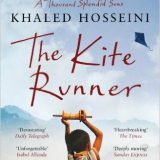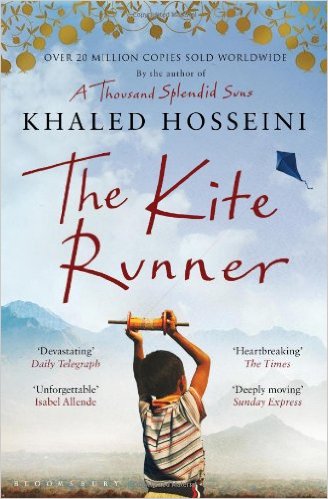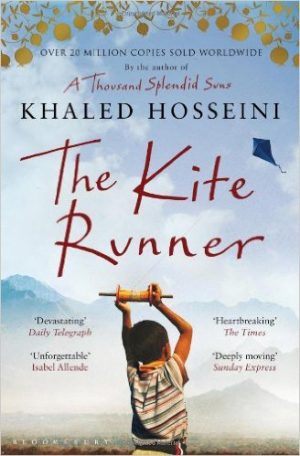The Kite Runner – Khaled Hosseini – 2003
Posted by Lale on 14/9/2005, 16:49:48
Witless, predictable and repetitive. An insult to our intelligence. Awful. Waste of time.
~
Posted by Steven on 14/9/2005, 19:02:20
I agree with you, Lale. I’ve been reading reviews of it trying to learn what others have seen in this book that I didn’t. What bothered me most were the improbable coincidences, the clichés, and the forced irony. Many of the plot elements seemed to be borrowed from movies (e.g. there was a scene lifted from The Magnificant Seven, a film even mentioned in the book), and the whole story seemed to be at the made-for-Hollywood level. I was hoping at least to get a sense of another place and culture, but what Kite Runner offered was very superficial.
~
Posted by Seema on 15/9/2005, 15:12:12
This book reminded me of bad films from Bollywood (“for you a thousand times indeed!” – no better than dialogues from some terrible films I’ve had to sit through).
I was hoping that the author would explore the question of why taliban happened. We all know it was brutal but I was hoping for more and didn’t get it. The only parts I liked were the parts in california – a lot of the places he mentions are places I’m familiar with and the description of the Afghani market was pretty bang on.
I still don’t see what the hype is all about. Yes, the book was a page-turner but not in a good way – it was a page-turner in the sense that I did not feel the need to really introspect or reflect upon anything that was happening. Not a good thing imo :). I was waiting for the time when you guys would get around to reading it!
-Seema
~
Posted by Lale on 15/9/2005, 18:03:12
: movie reminded me of bad films from Bollywood (for you
: a thousand times indeed! – no better than dialogues
: from some terrible films I’ve had to sit through).
Yes! It was exactly like the bad bad bad Turkish movies I watched as a child. It was also very much like the simple children’s books I used to read. The plot was immediately known to me, I knew all about Baba and Hassan, etc.
In Turkey, this kind of cheap literature (in books and in movies) used to be very common. There are always bad rich people. There is one good rich person/family. There are bullies. Sometimes a rich kid frames a poor kid. (Or a vicious stepmother frames the child of her husband.) There is always an orphan. The orphan and one rich person turn out to be related. Etc. etc. Cliché-ridden, stupid dialogues… Soap operas have more intelligent plots.
Like Steven said it was so superficial. And I also agree with his assessment that it was infested with “improbable coincidences, the clichés, and the forced irony”.
This book made Da Vinci Code look like high-literature. At least in Da Vinci Code (also predictable and with inane dialogues) there was some history, some research … It was a silly but fun-to-read book. This one was not fun, was not enlightening, was not enriching in any way, was not plausible, believable; had unrealistic plot and dialogues, it was the worst imitation of a book I read this year. Worse than Orhan Pamuk’s “Snow”.
At times the narration was so pathetic that I had to laugh out loud. Everyone tells the narrator that he’ll be a great writer one day. Everyone is praising his writing with “I never knew you could write like this” and so on. Why don’t we get to see any of that great writing? Making your characters repeatedly say that you are a great writer doesn’t make you a great writer.
What surprises me is the reaction from some seemingly smart readers. Look what Isabel Allende says:
“It is so powerful that for a long time everything I read seemed bland.”
Powerful? What was so powerful about this book? It had no power at all. It didn’t have the power to engage or stimulate intelligent thought. It is a stupid book, in style, in plot, in everyway. I try to imagine what kind of books Isabel Allende reads that are more bland than this. Amongst the books I read in my adult life (and there were many I didn’t like) I can’t remember any other book that was bland-er (!) than this.
: Kite Runner is a politically opportune novel catering to Western audiences.
Friederike, you are right, definitely an opportunistic endeavour. Trying to cash in on the name (and infame) of Afghanistan. A few farsi words here and there don’t make an Afghani book, let alone a good Afghani book.
Phew. That’s off my chest.
Lale
~
Posted by Steven on 21/9/2005, 12:43:21
Since it is unlikely that there will be much further discussion on this book, and many of our members have opted not to read or finish it, I thought I would offer up a more comprehensive review.
The Kite Runner by Khaled Hosseini is the story of Amir, son of a wealthy Afghan businessman. The story begins in the early 1970s when Amir is a child and Afghanistan is a monarchy. When the communist government assumes power, Amir, now a teenager, and his father flee to the United States (his mother died at his birth). Amir carries with him the private shame of having betrayed his best friend, Hassan, who was the son of his father’s trusted servant. The tale continues with the family’s financial struggles as refugees in California and concludes with Amir’s eventual return to Taliban-ruled Afghanistan where he finally confronts his guilt.
The popularity of Kite Runner is due, in large part, to its being set in Afghanistan. But readers expecting any special insight into the problems of this unfortunate country will be disappointed. The Afghanistan of the monarchy is depicted as a suburban paradise – nice houses, big cars, devoted servants, piles of consumer goods and plenty of leisure time to enjoy them. The poverty, political division, and social unrest that plagued the country are kept at arm’s length by the author. The communist takeover is made to appear as the work of a few corrupt, Russian-backed opportunists.
Similarly the Taliban are depicted as nothing but gangsters who preach strict adherence to Islamic law while privately practicing homosexuality and pedophilia. Not to defend either the Communist regime or the Taliban and their brutality, but you can not explain away revolutions and counter-revolutions as the acts of a few bullies. There were, and still are, underlying economic problems, religious and ethnic divisions, that lead a portion of the population to embrace even autocratic regimes in the hope of seeing their beliefs and interests prevail over others. Kite Runner, on the other hand, reinforces the naïve views of those who like to think the entire world is ready and eager to rise up and embrace Western democracy, middle-class values and lifestyles as soon as their dictatorial governments are toppled.
The human themes in Kite Runner center on Amir’s relationship with this father. Amir is the bookish, unassertive, sensitive type. His John Wayne-ish father, clearly disappointed in his son, patronizes Hassan, their servant’s son, who is more the father’s notion of an ideal man-child. Out of jealousy, Amir betrays Hassan to drive him away from the household. This further poisons Amir’s relationship with his father, and he is tormented by guilt into adulthood.
How many hundreds of male novelists have written autobiographical tales about their estrangements from their manly fathers? The story of Amir’s conflict and eventual reconciliation with his father is plausible and decently told, but there is nothing to recommend it over other examples of its type.
The guilt element of Amir’s character is promising, but the outcome of his inner conflict neither satisfies nor enlightens the reader. Amir is literally tricked into confronting his shame and maneuvered into a situation where he has almost no choice but to redeem himself by sacrifice. Even after he has “done the right thing,” he remains an unappealing character because he hasn’t earned his inner peace through any major revelation or willful action of his own.
The most positive side to Kite Runner is the depiction of the life and cultural challenges of the Afghan refugee community in California. The clash of cultures and of generations, the way different families choose to adapt or defy change, is related in a straightforward, convincing and interesting manner. It’s unfortunate that this wasn’t the focus of the novel.
What ultimately disappoints most in Kite Runner is the author’s reliance upon clichés and improbable coincidence. At the end of the novel, the scenes and circumstances of Amir’s childhood keep replaying themselves to give him the chance to “do it right, this time.” Used sparingly, such a plot device could be acceptable. But after a steady stream of implausible happenings, Kite Runner has lost all credibility and is just insulting the intelligence of its reader.

Posted by Steven on 3/9/2005, 22:59:48
Here is some statistical background for Kite Runner. These are current statistics except as noted. One might assume that, because of wars and Taliban rule, conditions have deteriorated since the 1970s when the story is set, but that apparently isn’t the case.
Land Area: 647,500 sq km (slightly smaller than Texas). It is a landlocked country, mostly rugged mountains, only 12% of which is capable of supporting agriculture.
Population: 30 million (Canada = 32 million). Population of Afghanistan in 1975 was 14 million.
Capital and Largest City: Kabul, metropolitan population 3.2 million
Ethnic Groups: Pashtun 42%, Tajik 27%, Hazara 9%, Uzbek 9%
Religion: Sunni Muslim 80%, Shi’a Muslim 19%
Languages: Afghan Persian or Dari (official) 50%, Pashtu (official) 35%, Turkic languages 11%
Birth Rate and Death Rate: Both are the highest for any country outside Africa, and were even higher in 1970s. More than half the population is under 18.
Infant Mortality: 163 deaths/1000 live births (2nd highest in the world behind Angola)
Life Expectancy: 43 years (lowest outside Africa; Canada = 80; US = 77; Mexico = 75; Turkey = 72). Afghanistan’s life expectancy in 1970 was 38 years.
Fertility Rate: Each woman bears an average of 6.75 children (4th highest in the world and down from 7.7 in 1960)
Literacy Rate: Male 51%, Female 21% (4th lowest in the world)
GDP per Capita: $800 (US = $40,000; Canada = $31,000; Mexico = $9,600; Turkey = $7,400)
Electricity Consumption: The entire country uses about as much electricity as a city of 50,000 in the US or Canada.
Principal Export: Opium
~
Posted by Steven on 4/9/2005, 12:04:33
After reading in Kite Runner that schools in Kabul close for the winter months because of icy conditions, I wondered just how cold it gets. Here’s a comparison with cities familiar to our members:
Average daily low temperature in January:
Ottawa -16 C (4 F)
Kabul -7 C (19 F)
Ankara -3 C (26 F)
Paris 1 C (34 F)
Dallas 2 C (36 F)
Mexico City 6 C (43 F)
And how hot does it get in the summer? These are the average daily high temperatures for July:
Dallas 36 C (96 F)
Kabul 32 C (89 F)
Ankara 29 C (85 F)
Ottawa 26 C (79 F)
Paris 24 C (75 F)
Mexico City 23 C (73 F)
Note that Ottawa is not only the coldest, by far, but also has the most extreme variation from summer highs to winter lows.
Posted by Lale on 4/9/2005, 16:16:20
Thank you Steven. We learned nothing from the book, but thanks to you, ow at least we know a few things about Afghanistan.
















